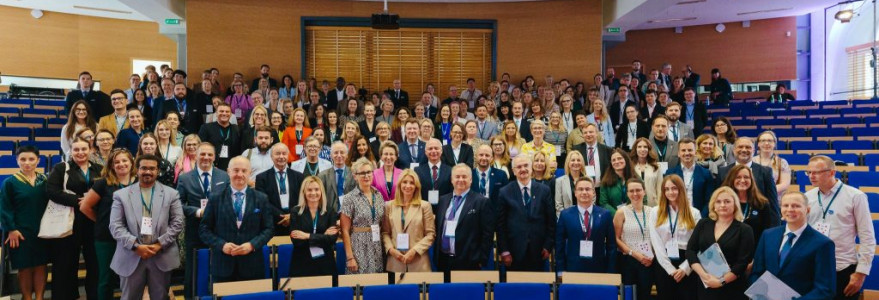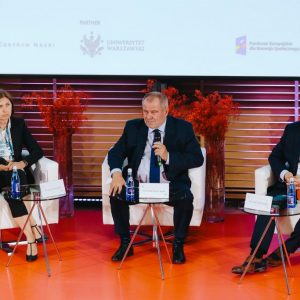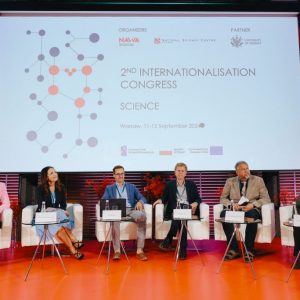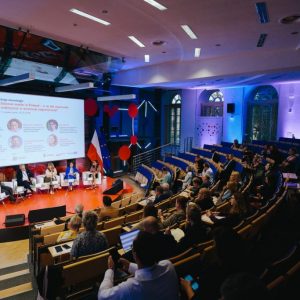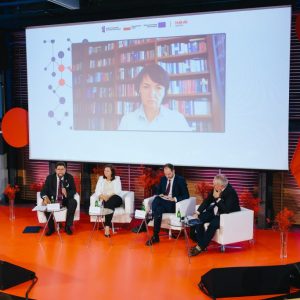“We have done a lot in recent years to raise our recognition in Europe and internationally. However, we are aware that the needs are greater. We are proud of the development of international cooperation in terms of student exchanges. We are building a European University. We are also winning more and more high-profile grants, including ERC grants,” Prof. Alojzy Z. Nowak, the UW Rector, said opening the 2nd Internationalisation Congress. The two-day event, of which the University of Warsaw was a partner, was attended by several hundred representatives of universities and research institutions from all over Poland.
How to effectively support international scientific cooperation? How do scientists in Poland cope in a dynamic international space? Is it worth participating in the European Universities Network? Where are we and where are we heading in the context of the EU Framework Programmes ecosystem?
These are some of the questions to which answers were considered by several hundred experts in higher education and science during the 2nd Internationalisation Congress, which took place from 11th to 12th September in the Old Library on the UW campus at Krakowskie Przedmieście.
Made in Poland
The event was a continuation of the debate started in the spring in Gdańsk. A key point on the agenda of the 2nd Congress was an inter-ministerial debate of the vice-ministers who deal with: science, foreign affairs, funds and regional policy, as well as development and technology, with the participation of Prof. Andrzej Szeptycki, Undersecretary of State in the Ministry of Science and Higher Education, Dr Henryka Mościcka-Dendys, Undersecretary of State in the Ministry of Foreign Affairs, Marta Mioduszewska, Deputy Director of the Department of Innovation and Development Support Programmes in the Ministry of Development Funds and Regional Policy, and Ignacy Niemczycki, Undersecretary of State in the Ministry of Economic Development and Technology.
The inaugural lecture on the internationalisation of research and science in higher education in the face of geopolitical challenges was given by Prof. Hans de Wit – a prominent Dutch expert in internationalisation.
During the Congress, the discussions dealt with such topics as the extent to which internationalisation should be included in the development vision for Poland, or the participation of Polish researchers in the EU Framework Programmes. In the context of the 25th anniversary of Poland’s participation in the EU Framework Programmes and the upcoming 10th EU FP, experts assessed the impact of international cooperation on the development of Polish research and scientific institutions.
Special attention was given to European strategies for retaining talent in research, innovation and entrepreneurship. Polish scientists who have successfully worked abroad shared their experiences, describing how international mobility has influenced their career development.
The congress also addressed the issues of European University Alliances – including 4EU+, of which University of Warsaw is a member – and their role in building strategic relationships and increasing the quality and efficiency of research.
Strategic internationalisation of the University of Warsaw
The closing panel of the Congress featured representatives of the University of Warsaw authorities, who presented the internationalisation strategy pursued by the University.
“We are aware of the importance of the diversity of research funding sources. Hence, institutions such as the National Academic Exchange Agency are very valuable. However, in order to use these sources effectively, it is necessary to have clearly defined directions for development. We have created a coherent programme in the context of the internationalisation of universities for the next four years. It is particularly important to us that our scientists not only conduct research abroad, but also teach there,” Prof. Alojzy Z. Nowak, Rector of the University of Warsaw, said adding, “It is very important to build internationally recognised research groups. We will do everything to ensure that such groups are created at the UW. We have a policy of creating incentives to attract the accomplished students to the university, especially winners of school Olympiads. It is also important to develop cooperation with business, which supports applied research, but also provides prospects for students. This is also important in the context of building an environment that is aware of the role of research in social life. In this context, I can give the example of the recently signed cooperation agreement with Poland in Silicon Valley Center for Science, Innovation, and Entrepreneurship. Support for doctoral candidates should not be forgotten either.”
Prof. Ewa Krogulec, the UW Vice-Rector, drew attention to the 2023–2032 strategy adopted by the UW last June: “We treat the strategy, in the development of which we have involved representatives of all groups of the UW community, as a certain system that plays a big role for internationalisation. From our perspective, internationalisation is not an end in itself, but a certain process – in the area of science, research, teaching, but also administration or influence on the socio-economic environment; internationalisation is a natural part of the development of the University of Warsaw.”
“The concept of internationalisation is gradual. We already have a high level of it at the University of Warsaw, but we are aiming for an even higher one. Internationalisation is a tool to achieve a completely different goal. And it is not about the number of students or employees going and coming from abroad. What is important is creating the right conditions for developing innovative solutions,” Prof. Sambor Grucza, the UW Vice-Rector said, adding: “We are part of the 4EU+ Alliance, creating the European University with seven other European universities. This is a means of opening up, creating a European melting pot and attracting the best students.”
A transcript of the event broadcast is available on NAWA’s YouTube channel.
The 2nd Internationalisation Congress was organised by the National Agency for Academic Exchange and the National Science Centre in partnership with the University of Warsaw. It was realised as part of the project entitled Strategy for Internationalisation of Polish Higher Education and Science from the funds of the European Funds for Social Development: Action FERS.01.05 Skills in Higher Education. The value of the project amounts to: PLN9,993,687.96.



